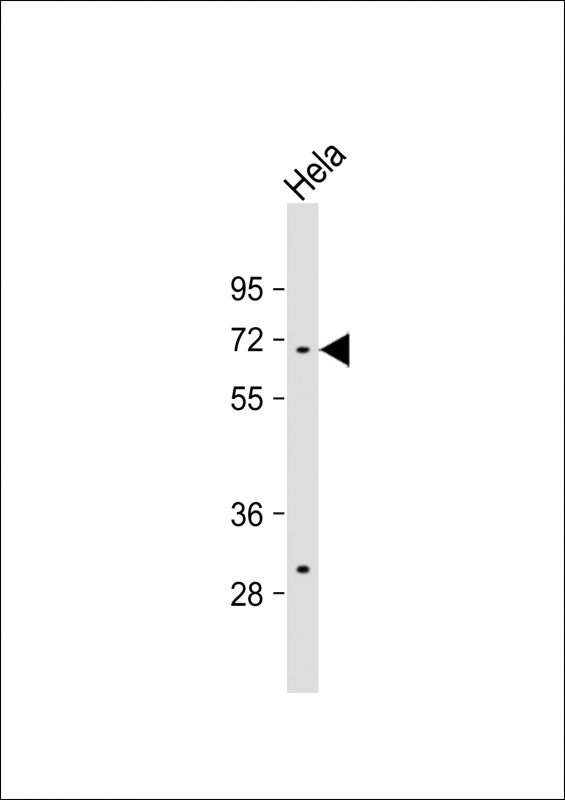
| WB | 1/1000 | Human,Mouse,Rat |
| IF | 咨询技术 | Human,Mouse,Rat |
| IHC | 咨询技术 | Human,Mouse,Rat |
| ICC | 技术咨询 | Human,Mouse,Rat |
| FCM | 咨询技术 | Human,Mouse,Rat |
| Elisa | 咨询技术 | Human,Mouse,Rat |
| Aliases | TATA box-binding protein-associated factor RNA polymerase I subunit B, RNA polymerase I-specific TBP-associated factor 63 kDa, TAFI63, TATA box-binding protein-associated factor 1B, TBP-associated factor 1B, Transcription initiation factor SL1/TIF-IB subunit B, TAF1B |
| Entrez GeneID | 9014 |
| WB Predicted band size | 68.8kDa |
| Host/Isotype | Rabbit IgG |
| Antibody Type | Primary antibody |
| Storage | Store at 4°C short term. Aliquot and store at -20°C long term. Avoid freeze/thaw cycles. |
| Species Reactivity | Human |
| Immunogen | This TAF1B antibody is generated from rabbits immunized with a KLH conjugated synthetic peptide between 367-396 amino acids from the Central region of human TAF1B. |
| Formulation | Purified antibody in PBS with 0.05% sodium azide. |
+ +
以下是3篇涉及TAF1B抗体的参考文献及其摘要概括:
---
1. **文献名称**: *TAF1B is required for assembly of the RNA polymerase I preinitiation complex*
**作者**: Moorefield, B., et al.
**摘要**: 该研究利用TAF1B特异性抗体进行免疫沉淀实验,发现TAF1B是RNA聚合酶I转录起始复合体的关键组分,其缺失导致核糖体RNA合成显著减少。
---
2. **文献名称**: *Dysregulation of TAF1B in hepatocellular carcinoma correlates with poor prognosis*
**作者**: Li, Y., et al.
**摘要**: 通过TAF1B抗体的免疫组化分析,作者发现TAF1B在肝癌组织中高表达,且与肿瘤增殖和患者生存率降低相关,提示其作为潜在生物标志物的可能性。
---
3. **文献名称**: *TAF1B interacts with the histone methyltransferase SETD6 to regulate rRNA transcription*
**作者**: Garcia, S.N., et al.
**摘要**: 研究结合TAF1B抗体的ChIP-seq和共定位实验,揭示了TAF1B与SETD6的相互作用对核仁区组蛋白修饰及rRNA转录的表观遗传调控机制。
---
**备注**:若需具体文献来源或补充更多研究,可进一步提供数据库检索关键词(如PMID或DOI)。
The TAF1B antibody targets TATA-box binding protein-associated factor 1B (TAF1B), a critical subunit of the RNA polymerase I (Pol I) transcription initiation complex. TAF1B, part of the SL1/Selectivity Factor 1 complex, plays a pivotal role in ribosomal RNA (rRNA) synthesis by recruiting Pol I to ribosomal DNA (rDNA) promoters. This process is essential for ribosome biogenesis, a fundamental cellular activity linked to cell growth, proliferation, and homeostasis. Dysregulation of TAF1B has been implicated in diseases marked by aberrant protein synthesis, such as cancers and developmental disorders.
TAF1B antibodies are widely used in research to investigate Pol I-mediated transcription mechanisms, nucleolar biology, and ribosome biogenesis. They enable detection and localization of TAF1B via techniques like Western blotting, immunofluorescence, and chromatin immunoprecipitation (ChIP). In cancer studies, these antibodies help assess TAF1B overexpression, which correlates with uncontrolled cell proliferation in tumors like neuroblastoma or glioblastoma. Additionally, they aid in exploring TAF1B's role in cellular stress responses and its interaction with oncogenic signaling pathways.
Available as polyclonal or monoclonal variants, TAF1B antibodies are typically validated in knockout models to ensure specificity. Their applications extend to diagnostics and drug development, particularly in targeting Pol I transcription as a therapeutic strategy. Researchers prioritize antibodies with high affinity and minimal cross-reactivity to avoid off-target effects in complex experimental systems.
×